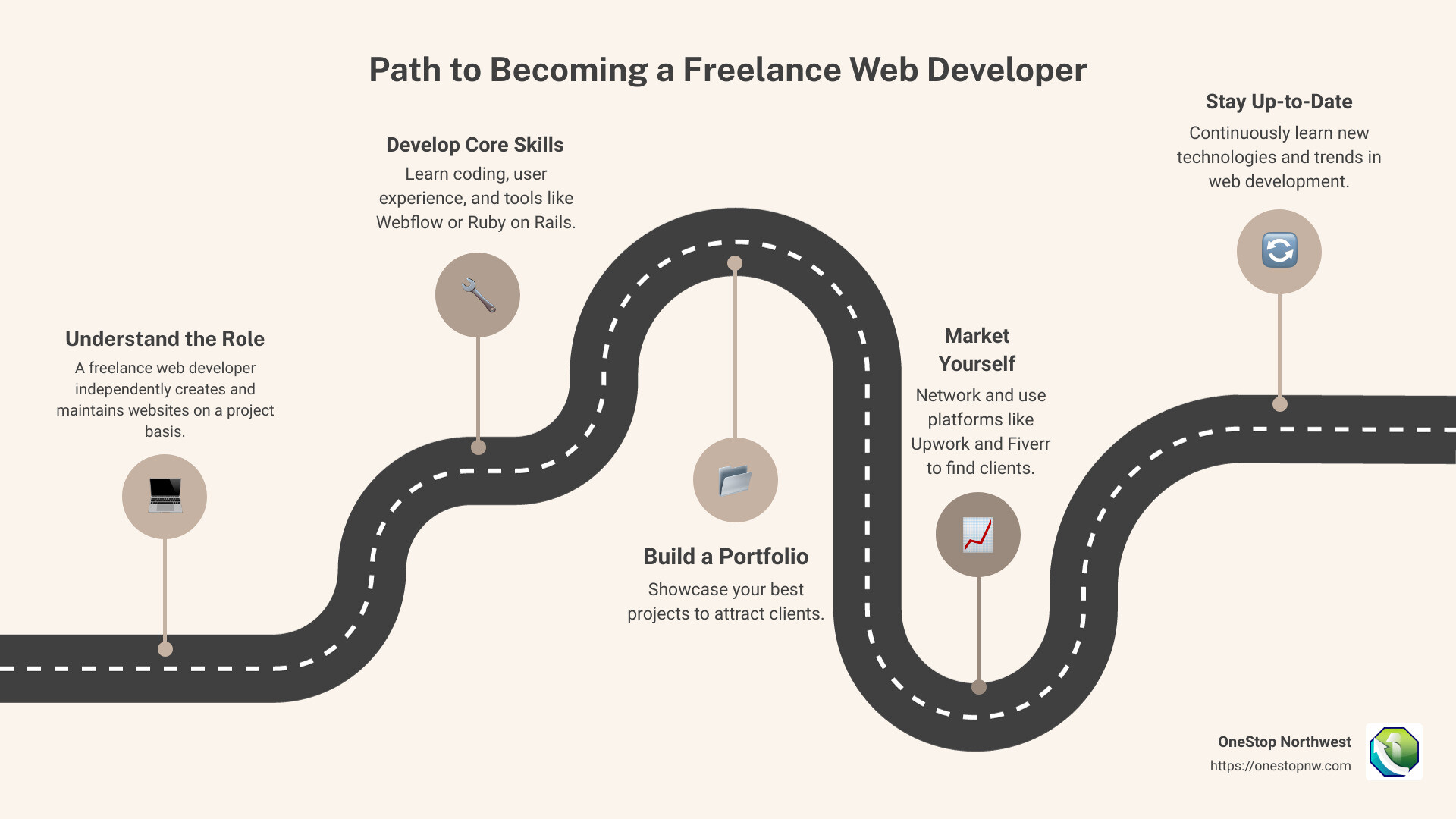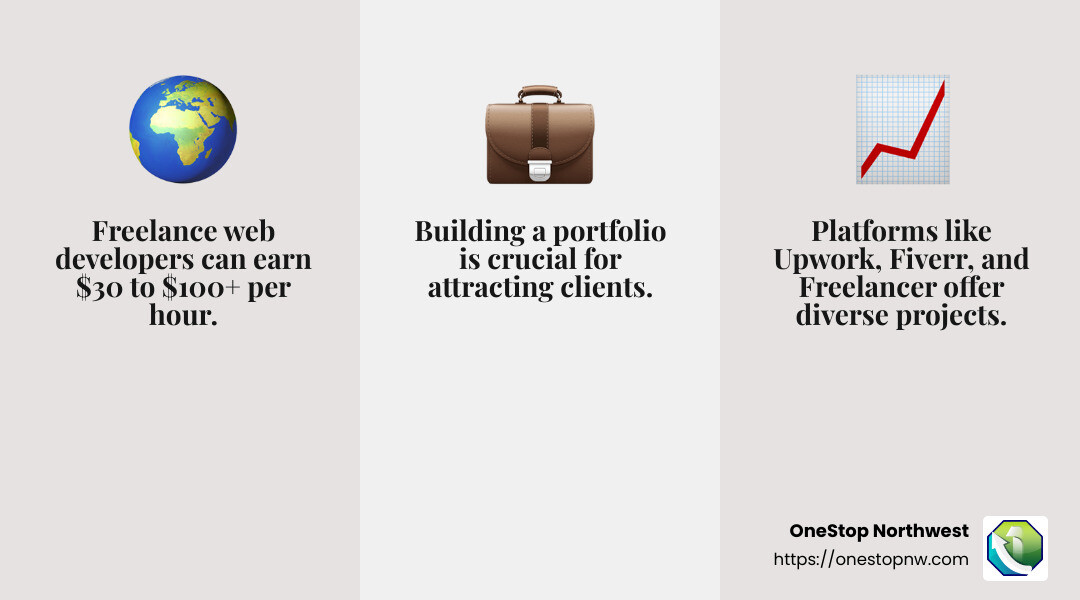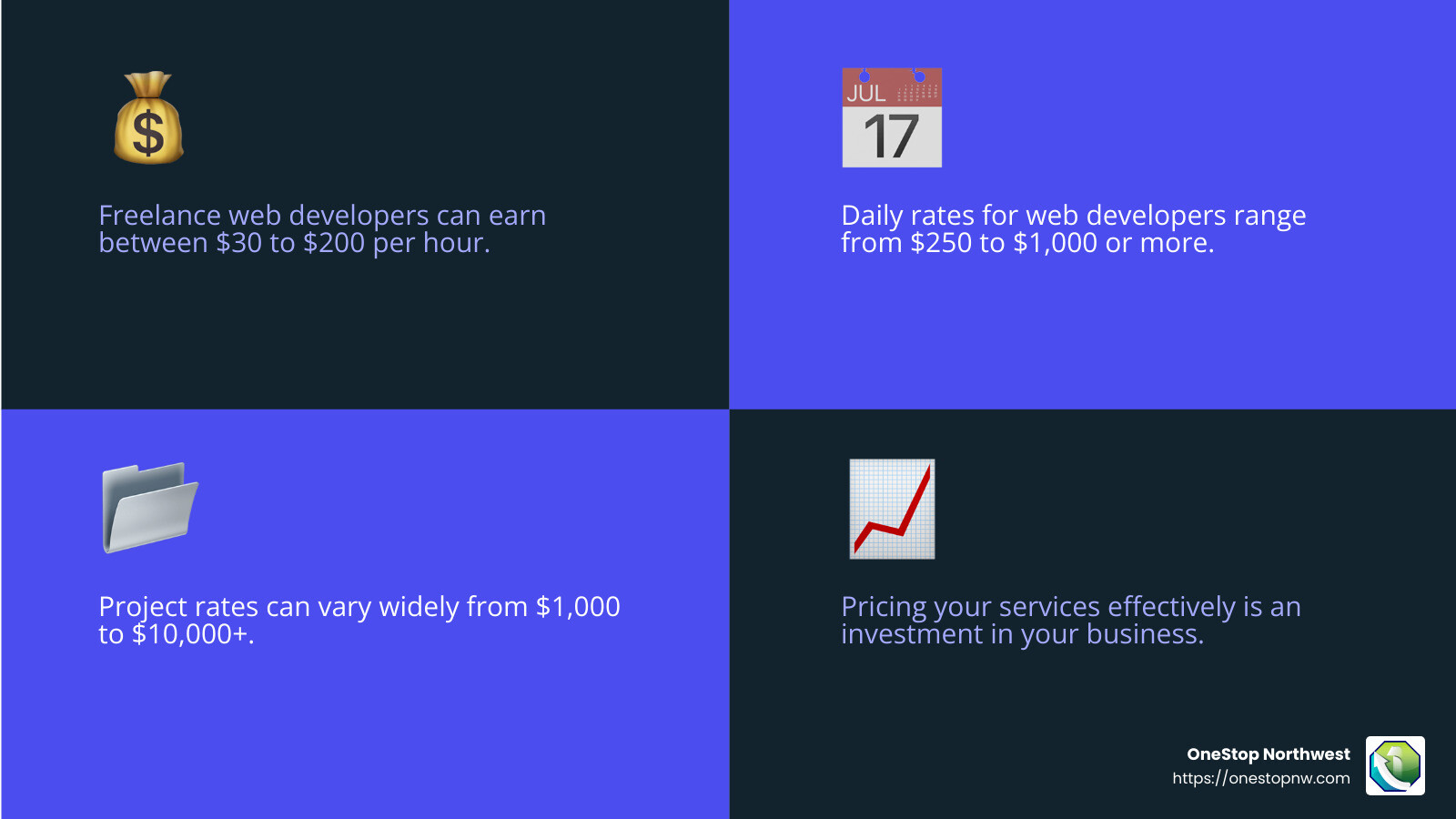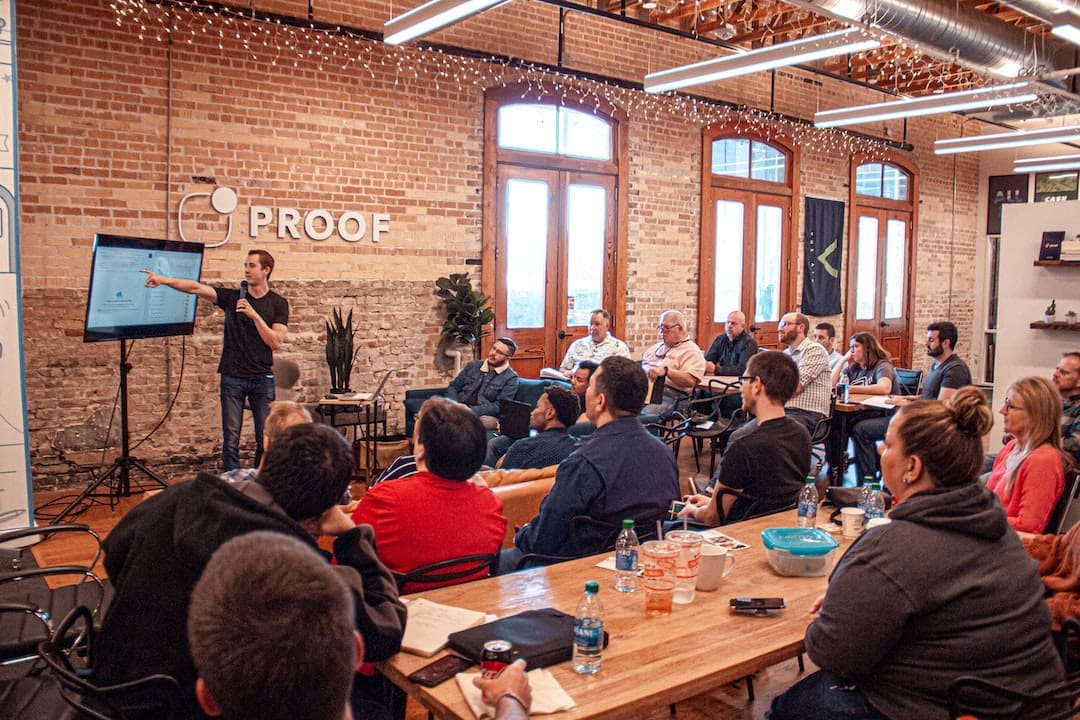Freelance Web Developer Guide: Top 7 Tips for Success
Freelance web developer roles have become an attractive career path for many in today’s digital age. For anyone considering this profession, here’s a quick overview to help guide you:
- Definition: A freelance web developer is a professional who creates and maintains websites while working independently, often contracted for specific projects.
- Requirements: Skills in coding, understanding user experience, and proficiency in tools like Webflow or Ruby on Rails.
- Benefits: Flexible work hours, the ability to choose projects, and potential for high earnings.
- Challenges: Need for continuous self-marketing, managing multiple clients, and staying updated with technology trends.
As someone passionate about web development, I, Dylan Cleppe, have spent over 20 years navigating the tech landscape. My journey has taught me that a successful career as a freelance web developer involves not just technical skills but also strong client relationships and personalized solutions.

Quick look at freelance web developer:
– find local web developers
– web designers in my area
– website builders in my area
What is Freelance Web Development?
Freelance web development is a dynamic and flexible career path that allows individuals to work independently, creating and maintaining websites for a variety of clients. In this role, a freelance web developer is not tied to a single employer but instead takes on projects from different clients, offering services like building user-friendly websites, designing engaging user interfaces, and developing complex web applications.
Freelance Opportunities
The opportunities in freelance web development are vast and varied. Platforms like Upwork, Fiverr, and Freelancer connect developers with clients looking for specific skills. These platforms have become popular because they offer a wide range of projects, from small tweaks on a personal blog to full-scale e-commerce sites.
Freelancing also allows developers to explore niche areas, such as WordPress development on sites like Codeable, which specializes in connecting clients with vetted WordPress experts. This means you can choose projects that match your interests and expertise, providing a sense of control and satisfaction in your work.
Career Path
The path to becoming a successful freelance web developer often starts with building a strong foundation in key coding languages and web development tools. As you gain experience, you can specialize in areas like front-end development (focusing on the parts of a website users interact with) or back-end development (handling server-side operations and databases).
Building a portfolio is crucial. A well-crafted portfolio showcases your skills and past projects, making it easier to attract clients. Networking with other professionals in the field and leveraging platforms like LinkedIn can also open doors to new opportunities.
As you progress, you may choose to expand your services beyond development, offering additional skills like SEO optimization or digital marketing. This diversification can lead to higher earnings and more job security.

In summary, freelance web development offers a flexible career path with numerous opportunities for growth and specialization. By honing your skills and building a robust network, you can create a rewarding career that aligns with your passions and professional goals.
How to Get Started as a Freelance Web Developer
Getting started as a freelance web developer requires more than just technical skills. You need to set up your business properly to ensure success. Here’s a simple guide to help you take those first steps.
Upfront Costs
Starting as a freelance web developer doesn’t require a huge investment. You’ll need a reliable computer and a stable internet connection. Investing in quality tools and software can also help. Expect to spend a few hundred dollars initially, but this can vary based on your specific needs.
Tax Forms and Insurance Coverage
As a freelancer, you’re essentially your own business. This means you need to handle your taxes. In the U.S., you’ll need to fill out forms like the W-9 for clients to report your income. Consider consulting a tax professional to understand your obligations.
Insurance is another important consideration. Look into professional liability insurance to protect yourself against claims of negligence or errors in your work. Health insurance is also crucial since you won’t have an employer to provide it.
Time Requirements
Freelancing offers flexibility, but it can also be time-consuming, especially when starting out. You’ll need to balance time between working on projects, managing client communications, and handling administrative tasks. Be prepared to spend significant time upfront building your client base and portfolio.
Networking
Networking is key to finding clients and opportunities. Join professional groups on platforms like LinkedIn and attend local meetups or online webinars. Engaging with other developers can lead to personal recommendations and new projects.
Personal Recommendations
Word of mouth is powerful in freelancing. Deliver excellent work, and your clients are likely to recommend you to others. Ask satisfied clients for testimonials and permission to use them in your marketing materials. This can build trust with potential clients.
Starting on a freelance journey involves setting up the foundational aspects of your business. With the right preparation, you can steer the challenges and enjoy the freedom and variety that freelancing offers.
Next, we’ll explore the essential skills needed to thrive as a freelance web developer.
Essential Skills for Freelance Web Developers
Being a successful freelance web developer isn’t just about knowing how to code. It’s about crafting websites that are simple, usable, and user-friendly. Let’s explore the key skills you need to master.
Simplicity and Usability
A great website is simple and easy to use. Your clients want sites that their users can steer without confusion. This means clear layouts, intuitive navigation, and minimal clutter. Less is often more in web design.
Usability is about making sure the site works well for all users. This includes ensuring the site is accessible to people with disabilities and works across different devices and browsers. A website that’s easy to use will keep visitors coming back.
User-Friendly Design
Designing a user-friendly website means focusing on the user experience (UX). This involves understanding who the users are and what they need. Use tools like wireframes and mockups to plan the layout and design before diving into code.
Consider this: A study from TechRadar found that sites with clear, user-friendly designs tend to have higher engagement rates. Make sure your designs are not only visually appealing but also functional and easy to steer.
Coding Languages
Knowing a variety of coding languages is crucial. Here are the basics you should be familiar with:
- HTML/CSS: The foundation of web design. HTML structures your content, while CSS styles it.
- JavaScript: Adds interactivity to your sites. It’s essential for creating dynamic and engaging user experiences.
- SQL: Used for database management. It helps you retrieve and store data efficiently.
- PHP/Ruby/Python: These server-side languages can help you build robust backend systems.
Each language has its strengths. Choose based on the project requirements and your expertise.
Project Management
Managing your projects effectively is key to freelancing success. You’ll need to juggle multiple clients, deadlines, and tasks. Here are some tips:
- Use tools like Trello or Asana to keep track of tasks and deadlines.
- Communicate clearly with clients to manage expectations and avoid misunderstandings.
- Break projects into smaller tasks to make them more manageable.
Project management ensures that you deliver quality work on time, which is crucial for building a solid reputation.
Mastering these skills will set you on the path to becoming a successful freelance web developer. Next, we’ll look at where to find freelance web development jobs and how to connect with potential clients.
Finding Freelance Web Development Jobs
Once you’ve honed your skills as a freelance web developer, the next step is finding jobs. There are several platforms and strategies that can help you connect with clients and start building your freelance career.
Online Platforms
-
Upwork: One of the largest freelance marketplaces, Upwork offers a wide range of web development jobs. It’s a great place to start if you’re looking for variety and flexibility. You can find both short-term gigs and long-term projects here.
-
Fiverr: Known for its gig-based structure, Fiverr lets you offer specific services at set prices. It’s ideal if you have niche skills or want to showcase unique offerings.
-
Freelancer: This platform connects freelancers with employers from all over the world. It’s similar to Upwork but with a different bidding system. You can find projects ranging from small fixes to full-scale website development.
-
Toptal: If you’re an experienced developer, Toptal might be the right fit. It’s known for its rigorous screening process, accepting only the top 3% of freelancers. Companies like Microsoft and Salesforce use Toptal to find top-tier talent.
Networking and Personal Connections
-
Networking Groups: Join local or online networking groups related to web development. These groups can be a fantastic resource for finding job leads and getting referrals. Websites like Meetup or LinkedIn can help you find relevant groups.
-
Colleagues and Friends: Don’t underestimate the power of word-of-mouth. Let your friends and former colleagues know you’re available for freelance work. They might know someone looking for your skills.
-
Online Communities: Engage in online forums and communities like Reddit’s webdev or Stack Overflow. These platforms allow you to showcase your expertise, answer questions, and potentially attract clients who need your skills.
Tips for Success
- Create a strong portfolio showcasing your best work. Clients want to see what you can do.
- Set up a professional website to highlight your skills, services, and contact information.
- Stay active on social media and professional networks to increase your visibility.
Finding freelance web development jobs requires effort and persistence, but with the right approach, you can build a steady stream of clients. Next, we’ll explore how to price your freelance web development services effectively.
Pricing Your Freelance Web Development Services
Pricing your services as a freelance web developer can be tricky but essential for success. You want to set rates that reflect your skills and the value you bring while staying competitive in the market.
Understanding Different Pricing Models
-
Hourly Rates: Many freelancers charge by the hour. According to research, web developers typically earn between $30 to $200 per hour. The rate can vary based on your experience, the complexity of the project, and market demand.
-
Daily Rates: Some projects might require you to work full days. In such cases, consider setting a daily rate. This can range from $250 to $1,000 or more, depending on the project’s scope and your expertise.
-
Project Rates: For larger projects, it can be beneficial to set a flat fee. This approach allows clients to know upfront what they’ll pay, and it can help you manage your time better. Project rates can vary widely, from $1,000 to $10,000 or more, based on the project’s complexity and your skills.
The Pricing Process
-
Evaluate the Project: Assess the project’s requirements, deadlines, and complexity. This will help you determine the effort and time needed.
-
Research the Market: Look at what other freelancers in your niche are charging. Platforms like Fiverr offer insights into average fees for various web development services.
-
Consider Your Costs: Factor in your operational costs, such as software, hardware, and utilities. Ensure your rates cover these expenses and provide a profit margin.
-
Communicate Clearly: When discussing fees with clients, be transparent about what’s included in your pricing. Outline deliverables, revisions, and any additional costs.
Pricing as an Investment
Your pricing is not just a number—it’s an investment in your business. Fair rates can attract quality clients who value your work. Conversely, setting prices too low might attract clients looking for a bargain rather than quality.

By understanding and implementing the right pricing strategies, you can ensure your freelance web development business is profitable and sustainable. In the next section, we’ll explore the benefits and challenges of being a freelance web developer.
Benefits and Challenges of Freelance Web Development
Being a freelance web developer comes with its own unique perks and problems. Let’s explore what you can expect.
Benefits
1. Freedom and Independence
One of the biggest draws of freelance work is the freedom it offers. You get to choose the projects you want to work on and set your own schedule. This independence allows you to balance work with personal life, tailoring your career to fit your lifestyle.
2. Variety of Work
Freelancing means you’re not tied to a single company or project. You can work on a range of projects, from designing sleek e-commerce websites to developing complex web applications. This variety keeps your work interesting and helps you build a diverse portfolio.
3. Self-Driven Growth
As a freelancer, you’re in charge of your own development. You decide which skills to learn and which projects to pursue. This self-driven growth can be incredibly rewarding, allowing you to shape your career path and stay updated with the latest technologies.
4. Time Flexibility
Freelancers often enjoy flexible working hours. Whether you’re a night owl or an early bird, you can work when you’re most productive. This flexibility also means you can take breaks when needed, reducing burnout and improving your work-life balance.
Challenges
1. Micromanagers
While you have the freedom to choose your projects, you might encounter clients who are micromanagers. They want to control every aspect of the work, which can be frustrating. It’s important to set clear boundaries and communicate effectively to manage such situations.
2. Income Uncertainty
Unlike a regular job, freelancing can come with income fluctuations. Some months might be busy with high-paying projects, while others could be slow. This uncertainty requires careful financial planning and a good savings strategy.
3. Self-Motivation
Without a boss or team to motivate you, staying productive can be challenging. You need to be disciplined and manage your time well to meet deadlines and keep clients happy.
4. Lack of Benefits
Freelancers don’t get traditional employee benefits like health insurance or retirement plans. You’ll need to secure these independently, which can add to your expenses.
Despite these challenges, many find the benefits of freelancing outweigh the downsides. With the right approach, you can enjoy a fulfilling and flexible career as a freelance web developer.
Next, we’ll tackle some frequently asked questions about freelance web development.
Frequently Asked Questions about Freelance Web Development
Can I freelance as a web developer?
Absolutely! Freelancing as a web developer offers a lot of freedom and flexibility. You have the chance to work on a variety of projects, from crafting user-friendly websites for small businesses to developing complex applications for larger companies. This variety keeps the work fresh and exciting. Plus, you get to choose your own hours and work from anywhere, whether it’s your home office or a coffee shop.
How much does it cost to hire a freelance web developer?
The cost of hiring a freelance web developer can vary widely depending on the project scope and the developer’s experience. Typically, you might pay anywhere from $30 to $200 per hour. For larger projects, you might encounter daily or project rates, which can range from $250 to $1,000+ per day or $1,000 to $10,000+ per project. It’s important to understand the pricing process and view it as an investment in quality and expertise. Make sure to discuss and agree on pricing upfront to avoid surprises.
How much can freelance web developers make?
Freelance web developers can earn a wide range of incomes based on their skills, experience, and the type of projects they take on. Hourly rates typically range from $30 to $100+, while daily rates might go from $250 to $1,000+. For entire projects, earnings can vary from $1,000 to $10,000+. Your income as a freelancer will depend on the demand for your skills, your ability to market yourself, and the time you invest in finding and completing projects.
Conclusion
Freelancing as a web developer can be both rewarding and challenging. As you steer this career path, having a strong digital presence is crucial. This is where OneStop Northwest comes into play. Located in Union, Washington, we offer a comprehensive range of services designed to boost your business’s digital and physical presence.
At OneStop Northwest, we specialize in custom web design that reflects your brand and engages your audience. Our team is committed to excellence, ensuring your website is not only visually appealing but also functional and user-friendly. We understand that a well-designed website is a powerful tool for business growth.
Beyond design, we focus on SEO optimization to ensure your site ranks high on search engines. This means more visibility and potentially more clients for your freelance business. Our services are not just limited to web design and SEO. We offer a broad spectrum of solutions, including graphic design, corporate branding, and social media management, to name a few.
Partnering with us means choosing a dedicated team committed to your success. We provide the tools and expertise needed to set up and launch the ideal platform for your business operations. Whether you’re just starting or looking to improve your current setup, we have the solutions you need.
Ready to lift your digital presence? Contact us today to learn more about how our comprehensive services can benefit your business. With OneStop Northwest, your success is our success. Let’s build something great together.


